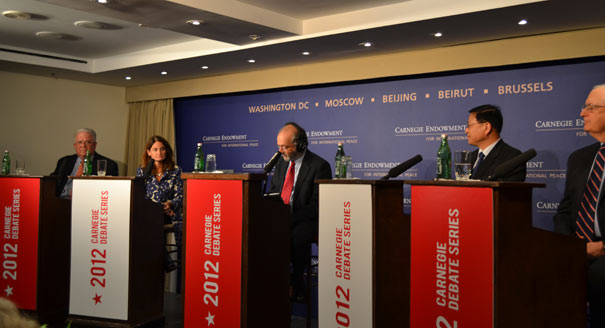Registration
Thank you!
You will receive an email confirming your registration.
BBC Radio’s Robin Lustig moderated a debate with Elizabeth Economy, Chas W. Freeman, Jr., J. Stapleton Roy, and Yan Xuetong. This debate, the third in a three-part series sponsored by the Carnegie Endowment, was structured around three broad questions on how the next U.S. president ought to engage China. It was aired by the BBC’s The World Tonight.
China’s Economic Ambitions
- Forces of Globalization: The current tensions over China’s economic ambitions are simply a result of the forces of globalization, Economy said. There is no need for the United States to be suspicious of China’s ambitions. On the contrary, Economy said, the U.S. president must work with China to address issues brought about by globalization, such as cyber espionage and the need for more regulation. Yan agreed, adding that being suspicious of China stealing jobs from the United States is simply strange. The United States has been losing many jobs to many countries, but is only blaming China. Ultimately, U.S. policymakers need to better understand globalization and interdependency, Yan argued.
- U.S. Domestic Troubles: The United States does not have a China problem, but an investment and regulation problem here at home, Freeman asserted. No doubt, China has industry protection policies and improper laws on intellectual property, but this is not unique to China. Many developing and transitioning countries have similar practices. The United States ought to focus on adopting best practices from abroad while simultaneously making the psychological adjustment of living in a country that may no longer be number one, Freeman concluded.
- A Strong Chinese Economy: China’s economic goal is to raise the per-capita income of the Chinese people to that of a middle European country, Roy asserted. The United States should be supportive of that goal. The growth of the Chinese economy is fundamentally good for jobs in the United States. The United States can only reach its export goals with a strong Chinese economy, and the U.S. economy depends heavily on China’s market more than any other foreign market.
Military Containment for China?
- Broader Regional Policy: There are many countries and economies in Asia, Economy argued. The “pivot” toward Asia should be addressing all these countries, not just China. The response to a rising China ought to be continued U.S. responsibility, while encouraging China to do the same, she added. Currently, China has yet to become a fully responsible superpower.
- Economic Response: A military response is not the correct way to respond to China, Freeman asserted. Rather, there should be an economic response. There are simply too many issues in this world that cannot be addressed without China’s cooperation, he stated.
- Risking an Arms Race: “Contain” is the wrong word, Roy warned. China has the right to protect its territorial sovereignty along its many surrounding borders. What U.S. and Chinese leaders need to do is to hold serious discussions on what level of investments in military capabilities will be enough to reflect the reality of the security environment. Otherwise, he warned, both sides risk running into an arms race.
- Rebalancing: The “pivot” already quite clearly states that there will be a shift of U.S. energy toward Asia, Yan said. This is a strategic move that places the new center of the world in Asia. However, the pivot also describes itself as a strategy of rebalancing. The question is, “Rebalance whom?” The Chinese are weary that the goal is to target China. This would be a destabilizing move; instead, the strategy ought to be focused on creating a new relationship that focuses more on cooperation and peaceful competition, Yan said.
Compromising to Solve Global Crises
- Multilateral Resolutions: There are many other countries in this world and solving global issues will require cooperation and engagement with all of them, Economy said. The U.S.-China bilateral relationship is simply not strong enough to single-handedly withstand and address all the issues.
- False Historical Precedent: Some have suggested the U.S.-Soviet bipolar relationship as a lens for understanding U.S.-China relations, but this is a false analogy, Freeman said. Beijing and Washington will have to transition to a more cooperative relationship, simply because global issues will not be addressed and resolved if the United States and China do not agree, Freeman added. Roy agreed, adding that while there are a host of international problems that will need the cooperation of both countries, there should not be a G2 world order.
- Shared Interests: The United States and China need to find shared interests in global issues in order to resolve them, Roy asserted. Yan agreed, stating that there are many possible ways for China and the United States to find such linkages. There is virtually no chance of the two countries ever going to war, Yan added. The two countries already have to cooperate on economic issues. Furthermore, both are extremely rational.
